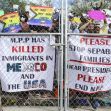In the United States of America, citizens rest easier with the idea that the government exists for the people. Other countries are perceived as just that—other. In other countries, democracy might not be provided, human rights can run amok, and government forces may be unleashed with little or no limitations. The U.S., on the other hand, has due process and freedom and systems set up so that if unlawful activity occurs, the law will remedy it. Even non-citizens in America are covered under much of the Constitution's laws and protections. The government will keep order, courts will deliver legality and fairness, and no one is above the law. At least, mostly.
With this ideological scene of justice in mind, we look at Jesus Mesa, Jr., a Border Patrol agent. Though a federal officer, Mesa is a man just like most, apart from the fact that he seems to be quite literally getting away with murder.
Murder traditionally has a relatively grim outlook for the one committing the act, in terms of repercussions. One is innocent until proven guilty, but once proven guilty of killing someone, prison and being sued for damages are the general reactions to the situation. We trust in the fairness of our judicial system to deliver justice to killers, to protect and uphold the powerful words of the Constitution.
In Hernandez v. Mesa, however, the killer's guilt is not in question. The case, in which Mesa shot and killed unarmed teenager Sergio Adrian Hernandez Guereca from across the Mexican border, was decided February 25, 2020. Justice Samuel Alito delivered the 5-4 majority opinion, ruling that damages claims cannot be applied to the cross-border shooting.
Hernandez, 15 years old, was playing with a group of other children at the Mexican border when Mesa arrived on his bicycle. Mesa detained one of the boys and, according to the FBI report issued the next day, ordered the rest of the teenagers to stop and retreat while they "surrounded the agent and continued to throw rocks at him." Video footage depicting the entire event largely contrasts this account. Justice Sonia Sotomayor said of the discrepancies, "I can't square the police officer's account of this incident with that film."
The publicly available video depicts Mesa's arrival and detainment of one of the teens. The rest of the group immediately runs from Mesa and the border, putting approximately 60 feet in between them, where Hernandez hides behind a pillar of the bridge. Possibly, someone was throwing rocks at this time from this distance. Mesa draws his firearm and aims while dragging the detained teenager on the ground alongside him, with no one else nearby. He shoots, killing Hernandez with a bullet to the head as he peeked out from behind the pillar.
The FBI investigation describes Mesa's actions as a "reasonable use of force" and "self-defense in response to the threat created by a group of smugglers hurling rocks at the agent and his detainee." On account of the report, the Department of Justice dismissed any criminal charges, concluding that Mesa's reaction was within the proper practice for U.S. Customs and Border Patrol.
Throwing rocks, though perhaps not quite as widely recognized at the border as teenagers playing innocent games, does hold some notoriety. There have been incidents of stones being flung at night to distract Border Patrol from smuggler runs, for example. Border Patrol responding with gunfire is comparably unexceptional. We do not yet know whether the rock-tossing portion of Mesa's account was factual, or how threatened Mesa might have felt under fire of stones from a distance of 60 feet (Mesa claimed he feared for his life). According to video and eyewitness accounts, Hernandez was not among any possible rock-throwers. Luckily for Mesa, the Supreme Court is not concerned at this time whether or not the use of his standard-issue AR-15 was the proper reaction to rocks thrown by teenagers.
What the Court is currently concerned with is a case called Bivens v. Six Unknown Named Agents, which has only been cited by SCOTUS twice since they ruled on the case in 1971.
In Bivens, six federal officers violated the Constitution with unlawful search and seizure, seizing and mistreating a man with no legal right to do so. Without a proper warrant, the Fourth Amendment was violated (the same as in the Hernandez argument). It was agreed that their actions were indeed a violation of Constitutional rights, but the case was brought to the Supreme Court because there was simply no legislation dictating whether or not federal agents could be sued for damages (nearly 50 years later, we still lack any such legislation regarding federal agents). State-level law enforcement has statutes providing legal redress, but they do not apply at the federal level. The Court ruled in Bivens' favor, establishing an implied cause of action theory that federal officers may indeed be sued for damages if they commit constitutional violations.
Now, Hernandez v. Mesa certainly possesses an added complexity which the justices did not have to consider in Bivens: Hernandez was on Mexican soil, and Mesa stood on American ground. As it stands, the Supreme Court had to decide if Mesa could even be tried to apply civil damages. In theory, a non-citizen is covered under much of the Constitution, but the cross-border issue complicates this issue further.
In Alito's opinion for Hernandez, he notes the fundamental differences between the Bivens and Hernandez cases and Congress's repeated refusal to legislate damages against federal officials operating beyond U.S. borders. He focuses on the Supreme Court's inability to interfere with foreign policy matters or border security. Though Alito does not explicitly overturn Bivens, Justice Clarence Thomas wrote in a separate opinion that "the time has come to consider discarding the Bivens doctrine altogether." These justices assert that the Supreme Court does not have the power to judge how Border Patrol agents exercise their power—or how they use their semi-automatic weapons, for that matter.
Justice Ruth Bader Ginsburg wrote a dissent addressing the majority opinion that may be described as objectively derisive. She was joined by Justices Stephen Breyer, Sonia Sotomayor, and Elena Kagan in arguing that recognition of Bivens, in this case, would not be a danger to foreign policy or national security. Without a standing Bivens opinion (as Justice Thomas hopes will soon be the case), federal agents who abuse the Constitution and their government-given power may no longer be held accountable for their actions by compensation to the victim.
Ginsburg also said that because Mesa was on U.S. soil, Hernandez's lack of U.S. citizenship should not be a factor. "The only salient difference here: the fortuity that the bullet happened to strike Hernandez on the Mexican side of the embankment," she wrote. "But Hernandez's location at the precise moment the bullet landed should not matter one whit." Mesa's lawyer agreed that the suit would have been proper if the entirety of the incident had occurred on American soil.
As clear as the Bivens opinion is, it has long faced issues. In 2017, SCOTUS ruled on Ziglar v. Abbasi, saying the Courts "consistently refused to extend Bivens to any new context or new category of defendants." In fact, the Supreme Court has "refused to do so for the past 30 years." Ziglar was a significant factor in describing why.
In the post-9/11 case, with country-wide fear of terrorism running rampant, undocumented immigrants were detained and grossly mistreated, with tales of solitary confinement for months on end and inhumane pretrial conditions. Upon release (at which point they were promptly "removed from the United States"), six of these immigrants brought a Bivens claim for constitutional violation of their rights. The plaintiffs hoped that holding the government accountable would discourage such unconstitutional conduct in the future, but the Court disfavored a Bivens application on account of national security.
Alito echoes these Ziglar concerns in his opinion for the Court's non-decision, citing the vital and unforgiving nature of national security. When Hernandez was brought before the United States Court of Appeals for the Fifth Circuit, Judge Edith Jones wrote in her opinion that if officers like Mesa thought it was possible to face a lawsuit for violating the Constitution, it may deter them from doing so by causing them to "hesitate in making split-second decisions," which "could undermine the Border Patrol's ability to perform duties essential to national security." She feared allowing Hernandez's family to sue Mesa could lead to lawsuits against U.S.-based predator drone operators targeting people abroad.
Hesitation before shooting unarmed innocents, in other words, cannot be allowed to stand in the way of potentially protecting other innocents, according to both Alito and Jones. This theory seems like a cognitively difficult concept to apply to facing repercussions for shooting an unarmed teenager without provocation, but it's their assertion nonetheless, and it seems as much supported by Ziglar as it is contradicted by Bivens.
So the facts of Hernandez v. Mesa, namely whether or not there could be any justification in the killing, are at present without merit to the case. The Department of Justice dismissed any chance of criminal charges. And since non-American citizens lack protection under U.S. federal law, the Hernandez family's only possible legal recourse was to sue Mesa for damages, if it were ruled possible. No court is able to analyze Mesa's guilt to procure a criminal penalty, and civil liability cannot be applied without first legitimizing the Hernandez family's lawsuit under Bivens.
The Supreme Court's decision to surrender its judicial oversight thus essentially grants immunity to Mesa and protects federal agents like him from consequence despite clear individual constitutional violations. It defers to Congress's power to hold federal agents accountable and deter misconduct.
The U.S. has repeatedly denied the Mexican government's requests to extradite Mesa for criminal charges. The Department of Justice declined to bring any charges against him, concluding that "accident, mistake, misperception, negligence and bad judgment are not sufficient to establish a federal criminal civil rights violation." They add that they regret the loss of life in the matter.
A 2013 study commission by Border Patrol reported that, in the span of two years, Border Patrol agents fired upon alleged rock-throwers across the border in at least 67 instances, which led to 19 deaths, Hernandez among them.






